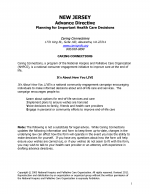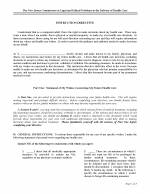A New Jersey advance directive is a set of instructions that contains either directives for a patient’s future medical wishes, assignment of a health care proxy, or both. The instruction directive allows the patient to list specific care they would or would not like physicians to deliver, and the health care proxy is assigned by the Principal to act in their stead for applicable medical decisions when the Principal falls into a state of incapacitation.
Spanish (Español) Version – Adobe PDF
What’s Included?
- Living Will
- Medical Power of Attorney (Healthcare Proxy)
- Practitioner Orders for Life-Sustaining Treatment (POLST)
Laws
- Living Will – NJ Rev Stat § 26:2H-57, NJ Rev Stat § 26:2H-64, NJ Rev Stat § 26:2H-113
- Medical Power of Attorney – NJ Rev Stat § 26:2H-61
- Physician Orders for Life-Sustaining Treatment (POLST) – NJ Rev Stat § 26:2H-130
Signing Requirements (NJ Rev Stat § 26:2H-56) – Two (2) Adult Witnesses
State Definitions
- Advance Directive for Health Care (NJ Rev Stat § 26:2H-55) – “Advance directive for health care” or “advance directive” means a writing executed in accordance with the requirements of P.L.1991, c.201. An “advance directive” may include a proxy directive or an instruction directive, or both.
- Declarant (NJ Rev Stat § 26:2H-55) – “Declarant” means an adult who has the mental capacity to execute an advance directive and does so.
- Instruction Directive (NJ Rev Stat § 26:2H-55) – “Instruction directive” means a writing which provides instructions and direction regarding the declarant’s wishes for health care in the event that the declarant subsequently lacks decision making capacity.
- Proxy Directive (NJ Rev Stat § 26:2H-55) – “Proxy directive” means a writing which designates a health care representative in the event the declarant subsequently lacks decision making capacity.
Versions (5)
Download: Adobe PDF
Download: Adobe PDF
Download: Adobe PDF
Download: Adobe PDF
 New Jersey Catholic Conference
New Jersey Catholic Conference
Download: Adobe PDF


